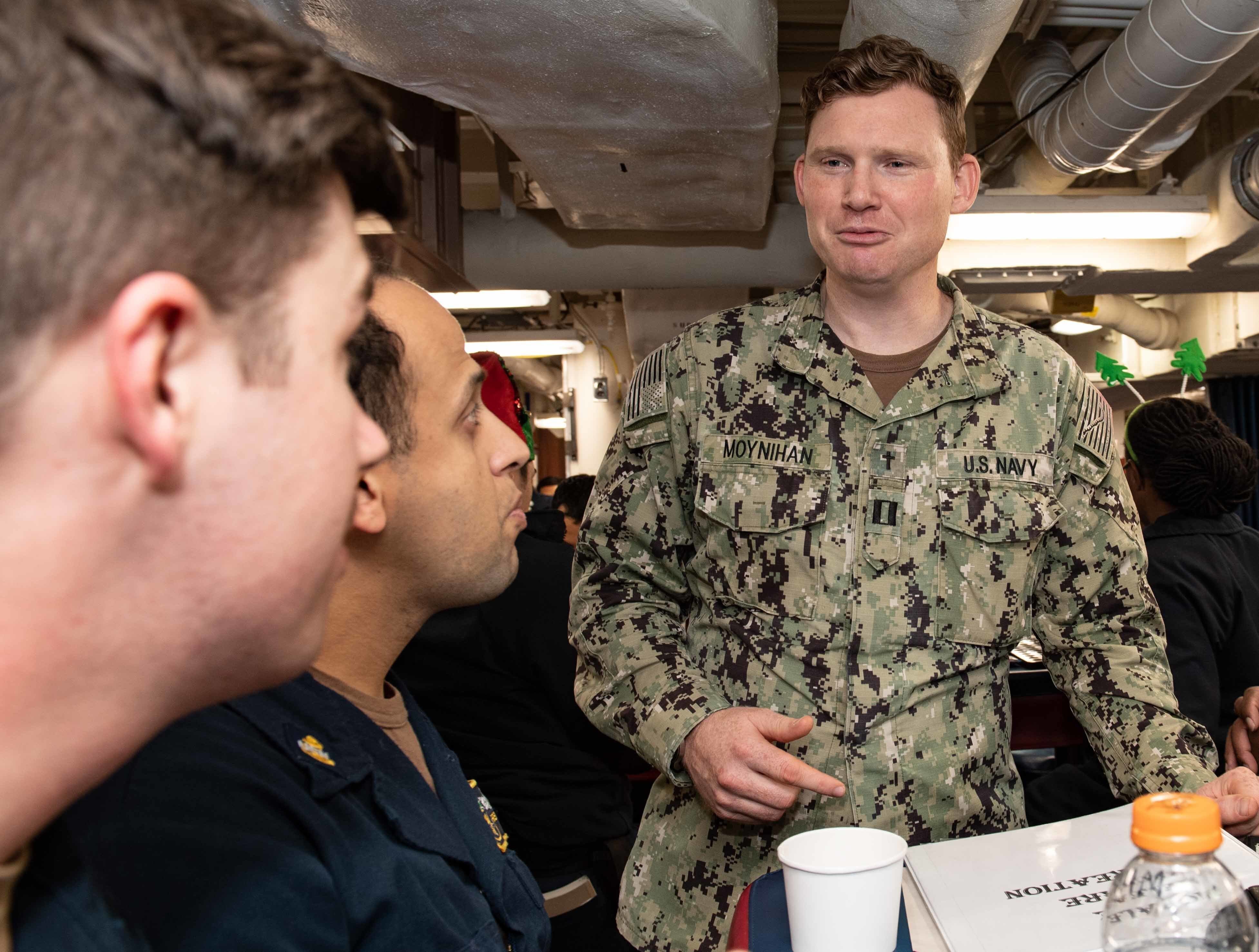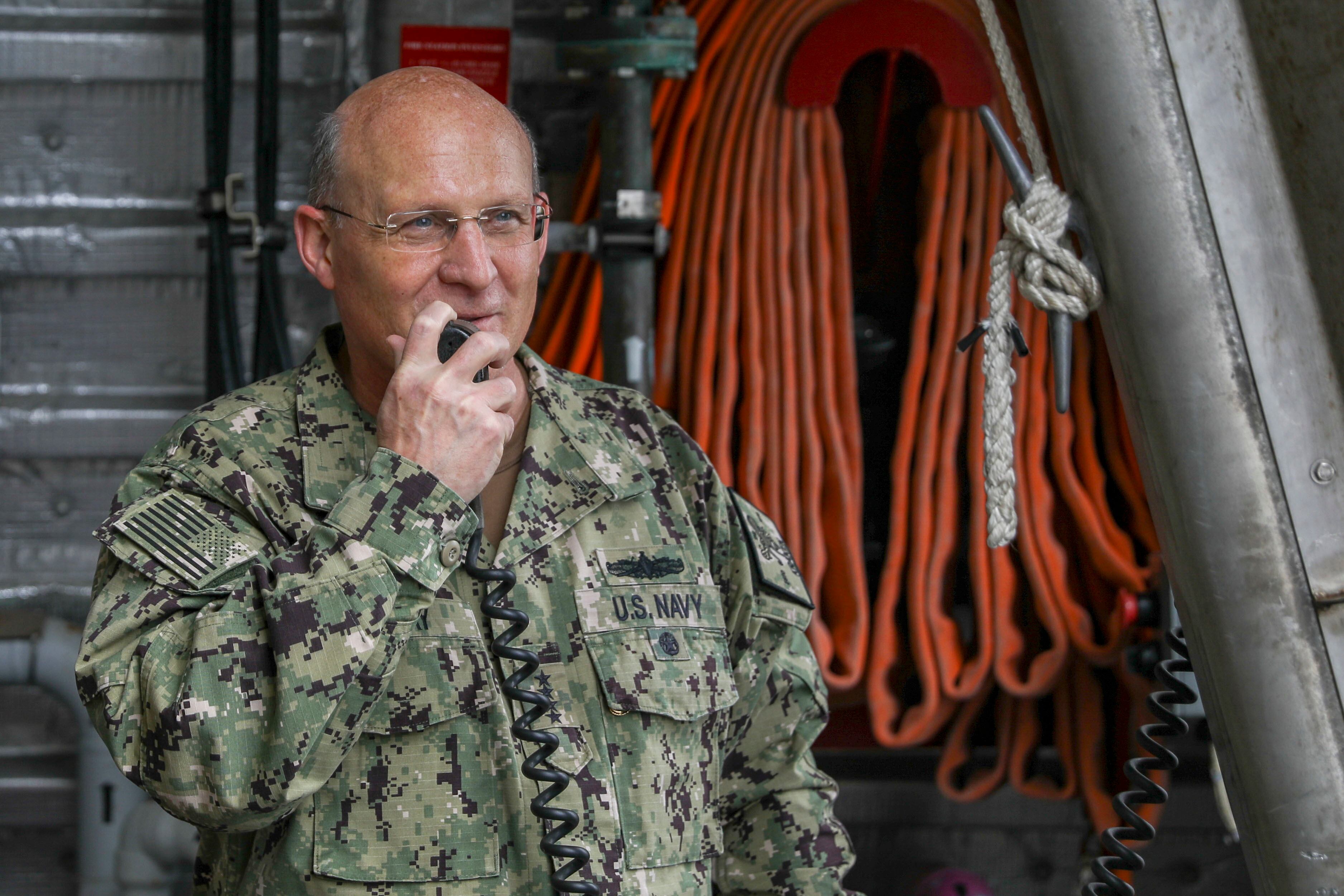ARLINGTON, Va. — The Navy’s most senior officer and enlisted sailor said suicides across the fleet are a major concern that they are attempting to address, weeks after the release of the investigation into multiple deaths by suicide aboard the aircraft carrier George Washington.
The service is facing challenges filling positions for mental health providers, which coincides with a national shortage, so the Navy is eyeing ways to recruit more mental health technicians.
“Mental health is a vexing problem for us,” Chief of Naval Operations Adm. Mike Gilday said Tuesday at the annual Surface Navy Association conference. “And we … continue to put resources against it.”
Recent efforts to improve mental health in the service include permanently embarking chaplains aboard destroyers — one of the “best things” the Navy has launched recently, according to the commander of Naval Surface Forces, Vice Adm. Roy Kitchener. The initiative was a shift from chaplains only joining destroyers during work ups as “ship riders.”
But Gilday said current efforts aren’t enough.
“The connectedness between us and amongst us is really, critically important,” Gilday said. “The first line of defense even goes below chief petty officers in terms of understanding, or trying to understand, what’s going on in the day-to-day lives of our shipmates. And if anything, our message is, ‘Stick around. We need you. We can help you.’
“There are multiple ways that we can do it, yet it’s still a vexing problem because people still choose to take their lives,” he said. “And so I would tell you, that’s what keeps us awake at night.”
Gilday said he’s open to ideas to address the matter.
Administering mental health exams is easier in some communities — such as explosive ordnance disposal units and Navy SEALs — than others, he noted. Even so, the Navy is aiming to improve mental health capabilities, Gilday said, and the service is maxing out the number of corpsman sent to school to become behavioral health technicians.
RELATED

The George Washington investigation released in December found that the three deaths over the course of six days in April 2022 were not related. However, the report also characterized the ship’s psychologist and the behavioral health technician as “overwhelmed,” and said sailors in need of help encountered a backlog of roughly four to six weeks for initial appointments.
Due to the suicides on the carrier, the Navy is examining the quality of service in shipyards, particularly aboard aircraft carriers, Gilday said. The George Washington has been undergoing its mid-life refueling and complex overhaul at Newport News Shipbuilding since August 2017.
“I would tell you that the Secretary of the Navy is very interested in the final investigation on GW that lays out in more detail what investments we should make to improve things,” Gilday told reporters here.
A total of 70 sailors died by suicide in 2022 — up from 59 suicides in 2021 and 65 in 2020, according to the Navy.
Master Chief Petty Officer of the Navy James Honea said that deaths by suicide trouble him more than any other issue facing the service, and that “it crushes me” when he reads about another suicide.
“The original, embedded mental health professional is a chief petty officer,” Honea said Wednesday at the conference. “I need to get them better tools, better education, stronger emotional intelligence on how to deal with sailors day to day. I need to start that at the E-3, E-4 level. And we can do that through our enlisted leader development program, to insert that education and make us all stronger.”
Secretary of the Navy Carlos Del Toro admitted that the service faces challenges competing with the private sector to bring in mental health providers. As a result, Del Toro said, the service needs to cultivate more mental health professionals within the service — starting with recruiting.
“There’s more than enough recruits that want to become corpsmen in the Marine Corps and the Navy, and we need to start recruiting more of them to become mental health technicians,” Del Toro said here Wednesday. “Now, it’s not going to happen overnight. But we’ve started that process now so that we can start recruiting more, investing more in their training, and get more mental health technicians that we can get out to the Fleet and the bases all around the globe to make a difference.”
Troops and veterans experiencing a mental health emergency can call 988 and select option 1 to speak with a VA staffer. Veterans, troops or their family members can also text 838255 or visit VeteransCrisisLine.net for assistance.









